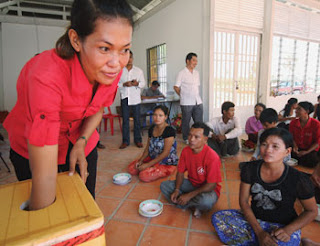Photo by: Pha Lina
Cao Minh Son is chief executive officer of Cambodia Vietnam Insurance, which insures Cambodia Angkor Air.
via Khmer NZ
Wednesday, 21 July 2010 15:01 Nguon Sovan
Cao Minh Son is chief executive officer of Cambodia Vietnam Insurance, which has operated in Cambodia since November last year.
After almost a year in Cambodia’s market, what do you think about the insurance industry here?
From CVI’s point of view, Cambodia’s insurance market has a great deal of potential for growth.
When you look at the revenue statistics over recent years, it has increased every year, except in 2009 due to the global financial crisis which delayed several large construction projects. The Cambodian market is very competitive, even when compared with Vietnam.
Could you compare the insurance markets in Cambodia and Vietnam?
One of the most noticeable differences is that in Vietnam insurance companies look to co-insure and spread risks amongst each other, whereas in Cambodia it rarely happens. In Vietnam, sometimes insurers fight for customers, but sometimes they sit down together to provide co-insurance to big projects.
For example, if I insured a building for US$30 million, but I didn’t have enough ability to insure it alone, I could insure only a part of it for $1 million.
In the future, we should have greater co-operation with each other in order to build the local industry and keep premiums in country.
Cambodia has six insurers and one re-insurer, how does this compare to Vietnam?
Six players in this industry is reasonable at the moment with the population [of Cambodia] at 14 million.
In Vietnam, there are up to 29 insurers, however the population is also large – up to 86 million.
In terms of registered capital and premium revenues, it’s also far different. Cambodian premiums were just $20 million last year, but in Vietnam it was up to $870 million.
For registered capital, to open a insurance company here it’s required by the finance ministry to have the registered capital of $7 million, but it’s $16 million in Vietnam, and it is now going to increase to $27 million.
What do you think about the perceptions of Cambodians towards buying insurance?
Generally speaking, the concept of insurance is fairly new, and it will require the public several more years to become more acquainted with the concept of insurance as part of their everyday life.
What are the benefits?
Quite simply it provides a certain level of protection for either a family or individual or business from financial problems if something unforeseen should happen.
In addition, the insurance company is someone you can depend upon.
Some Cambodians earn a very low income; sometimes it is not enough to support their daily needs, do you think they have money to buy insurance?
Of course most people don’t buy insurance, but in the city and for companies’ staff [it is different]. Normally, companies provide benefits for staff by buying accident insurance and health insurance for them, so we focus on them.
Now, we are focusing on selling insurance to workers at Vietnamese-run rubber plantations.
What are premium insurance revenues and claims for CVI up of the end of June?
As of June, CVI’s revenue for 2010 to date is $508,000, which equates to 50 percent of the target we set ourselves for this year.
The majority of our revenue has come from aviation insurance to Cambodia Angkor Air, followed by fire and automobile insurance. So far, everything is very good, claims which have come up so far at CVI are not more than $1,000, just small personal accidents and auto-claims. We gained a profit from the first year of operations.
What types of insurance does CVI offer?
In our first few years of operation, CVI will focus primarily on property and engineering.
We will pay particular attention to the large number of local and foreign investment-driven infrastructure projects being undertaken, especially those from Vietnam.
We have become the leading provider of aviation insurance of late, so we will look to maintain and develop this niche, too. Also, we’re looking at the sectors of energy, mining, oil and gas.
What is CVI’s strategy to gain market share in this industry?
We will look to take advantage of our inherent strengths and continue to support the interests of our shareholders. We are looking to develop the market to its full potential rather than compete for existing business.
We will expand our operations to some key provinces such as Siem Reap, Preah Sihanouk, and Kampong Cham.

































